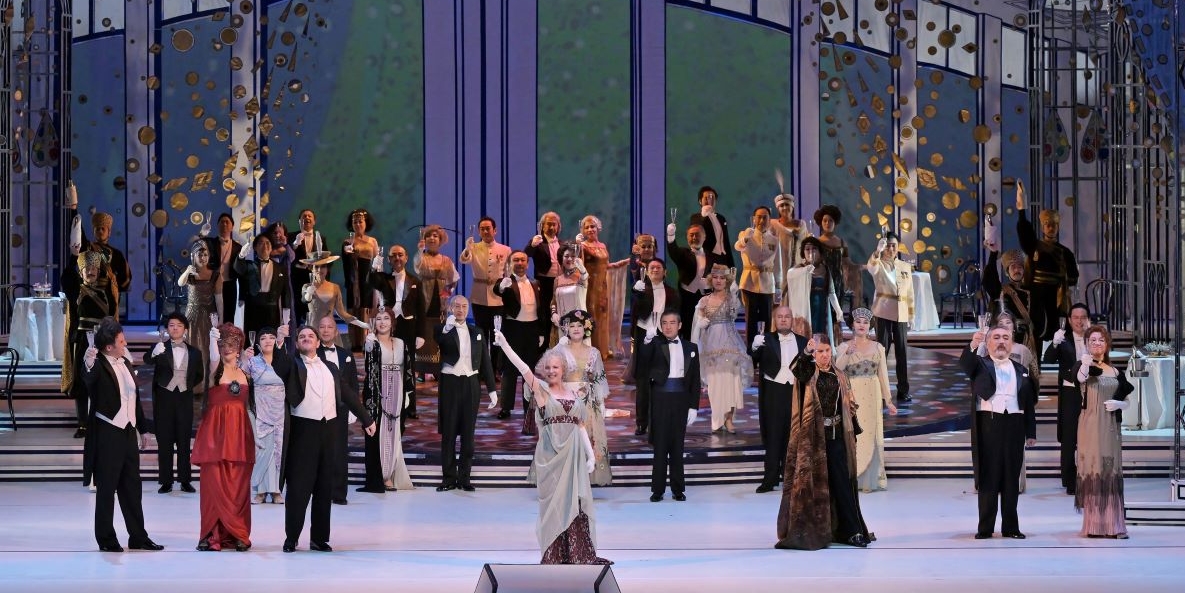What a delightful way to wrap up your day! A rendezvous with Heinz Zednik’s Die Fledermaus leaves you buzzing with energy for the next day, drifting off to dreamland with a wide grin, perhaps even a jaunty hum of Strauss II’s enchanting waltz lingering in your ears.
The story unveils operetta truism: Gabriel von Eisenstein faces prison for insulting an official. He attends Prinz Orlofsky’s all-night ball party with Dr. Falke before heading to jail. By orchestrating Orlofsky’s party, Falke plots revenge on Eisenstein for a prank. In this prank, Falke ended up abandoned and was laughed at by children after a fancy dress ball where he was drunk and dressed as a bat. At Orlofsky’s party, Eisenstein unknowingly seduces his wife, Rosalinde in disguise. The next morning in prison, Rosalinde reveals the pocket watch won from Eisenstein, and accuses Eisenstein for his seduction. Falke confesses to the plot, and Eisenstein blames Champagne, pleading for forgiveness.
Die Fledermaus is an immortal operetta, and everybody’s favourite, but Zednik’s production is especially enchanting with its elegant ball dances conducted by professional Tokyo City Ballet dancers; the warm feelings created by Japanese jokes seamlessly woven into the libretto shows symbiosis with western culture. The production is now in its 6th revival since its 2006 inception.
Olaf Zombeck’s sets, an embodiment of art deco with a hint of Klimt’s Viennese Secession, casts a golden spell, while his costumes whisk the audience away to the mesmerising world of Prinz Orlofsky’s ball, a visual feast where chic meets gorgeous. Under Yuji Tatsuta’s enchanting lighting, each scene unfolds like a fairy- tale picture book. Be it the dream-like ballroom, the sombre prison, or the patio of Eisenstein’s home where the pastel climbing plants on the pergola evoke a magical realm.
Eleonore Marguerre’s Rosalinde, clever and vivacious, sang with great flexibility in high-lying velocity passages, especially in her fiery Csárdás, convincing Eisenstein that she was a Hungarian countess. Tatsundo Ito’s bright and full timbre was sonorous and his voice and Marguerre’s went well together in “Trinke, Liebchen, trinke schnell”. While Tamara Gura as Prinz Orlofsky needed a little more vocal oomph, Thomas Tatzl shone brilliantly as Dr Falke particularly in Act 1. A Swedish soprano, Kerstin Avemo as Adele’s “Mein Herr Marquis”, was charmingly sung. A British Baritone, Jonathan McGovern’s Eisenstein struck the right balance between comedy and elegance, capturing the essence of Viennese high society. Frosch, the jailer, took an unexpected turn, singing “Schwipslied (Tipsy-Song) with humorous finesse, eliciting hearty laughter from the audience. Noteworthy is the sublime prowess of the New National Theatre Chorus, crafting a delightful symphony.
The Tokyo Philharmonic Orchestra led by the elegant baton of Patrick Hahn seamlessly played Strauss II’s magical melodies. Though a tad more briskness in the famous Die Fledermaus waltz would have been the cherry on top, the overall performance and production from start to finish was nothing short of thrilling.
In conclusion, this Die Fledermaus is tonic for the soul, a December tradition that mesmerises and energises, a fitting reward for a year’s hard work. Here’s to hoping it graces the stage annually, a perennial treat to look forward to!
New National Theatre, Tokyo, Japan
Composer: Johann Strauss II (1825-1899)
Libretto: Carl Haffner and Richard Genée, after Meilhac and Halévy.
Director: Heinz Zednik
Conductor: Patrick Hahn
Eleonore Marguerre, Kerstin Avemo, Tatsundo Ito, Thomas Tatzl
Until 12th December 2023
Running Time: 3 hrs 05 min. with 1 interval
Photograph: © Takashi Shikama/New National Theatre, Tokyo

